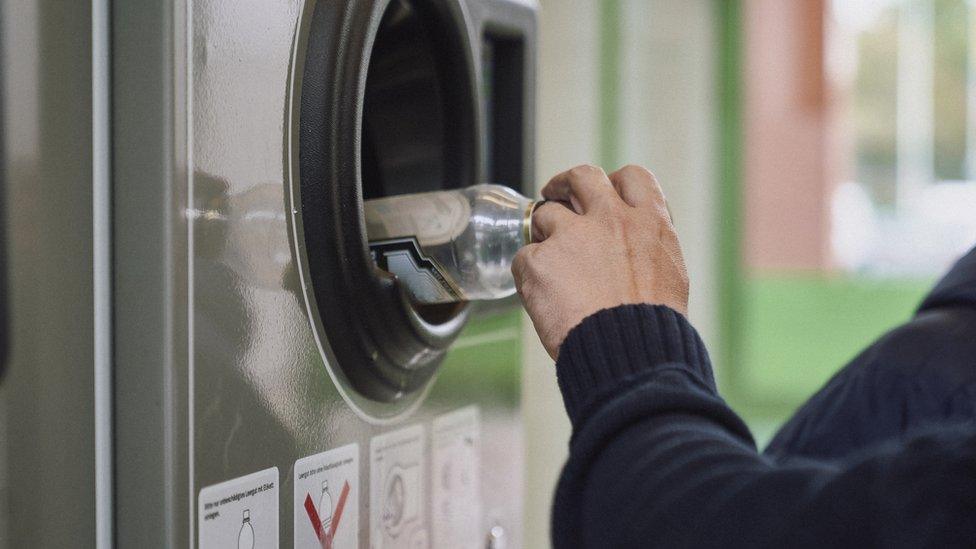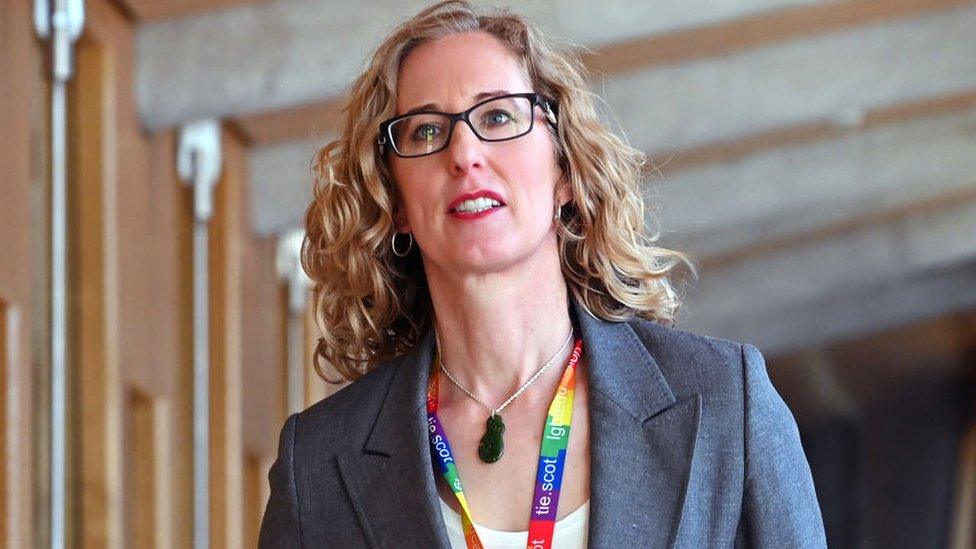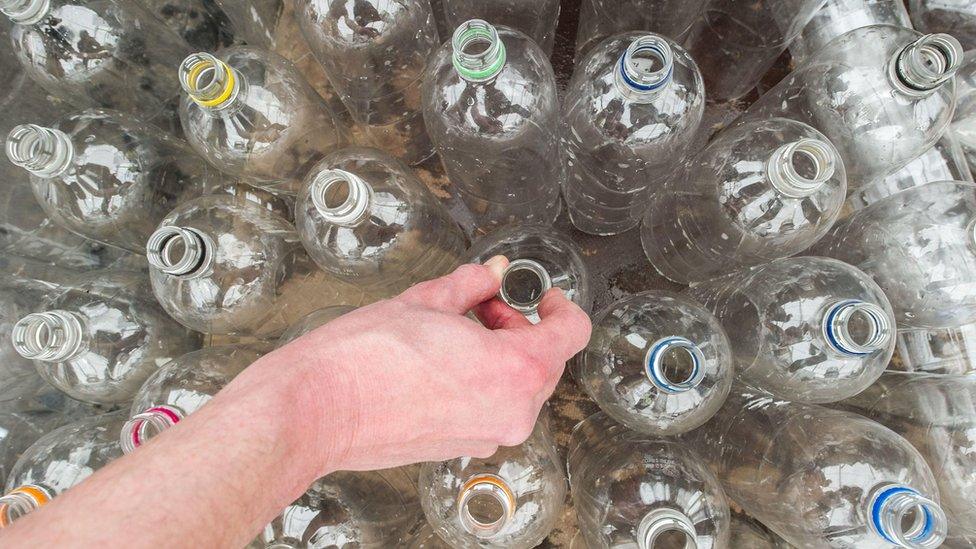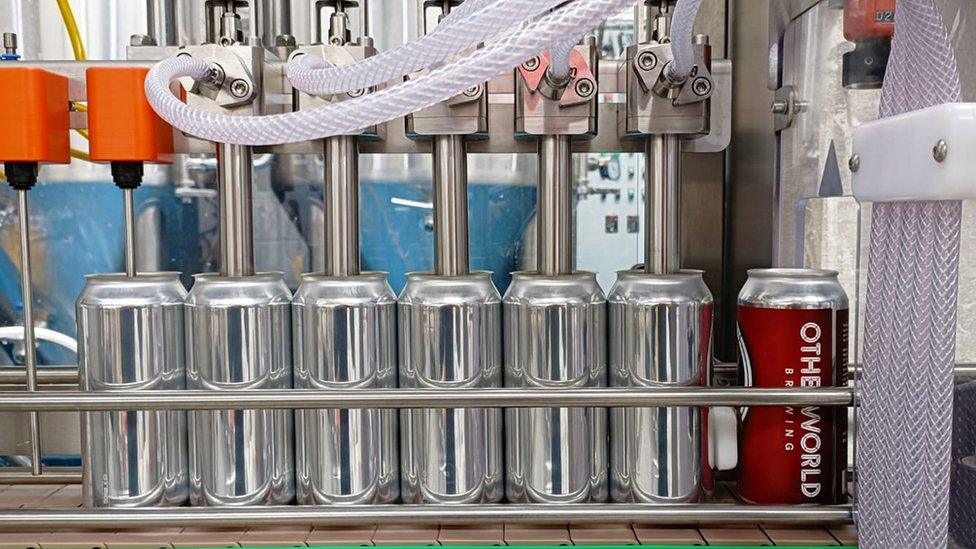Calls for compensation as deposit return scheme delayed
- Published

The trade association representing many major soft drinks companies says it will be seeking compensation from the Scottish government over the deposit return scheme.
The scheme - to encourage the recycling of more bottles and cans - has been delayed until at least October 2025.
It had been due to launch in March of next year.
The British Soft Drinks Association wants compensation for the money its members spent preparing for the scheme.
The members include Coca Cola and AG Barr, which produces Irn Bru.
Other organisations representing retailers have also said their members want compensation, with businesses across Scotland said to have spent about £300m ahead of the return scheme's intended introduction.
Circular Economy Minister Lorna Slater said she had no choice but to delay after the UK government excluded glass from the Scottish scheme last week.
That is despite the company that was due to run the scheme - Circularity Scotland - saying it believed there was no reason it could not have started in March without glass being included.
Opposition parties have accused Ms Slater of picking a constitutional fight with the UK government to divert attention away from her handling of the scheme, with many firms raising concerns about its implementation.
When it is finally introduced, the deposit return scheme will see a 20p charge placed on drinks containers which would be refunded to consumers when they return the bottles and cans in a bid to increase recycling levels.
Larger stores, shopping centres and community hubs will operate reverse vending machines for people to return their containers.
The delay means it will now not happen until recycling initiatives in the other parts of the UK are ready - which several Scottish firms had wanted.
Businesses are now calling for compensation after investing time and money into preparing for the scheme to launch.

Lorna Slater, the co-leader of the Scottish Greens, has been criticised for her handling of the scheme
Mo Razzaq, of the Federation of Independent Retailers, said it was seeking legal advice on the issue of compensation.
He said many retailers had already invested in reverse vending machines and they are now "trapped in contracts with reverse vending companies" which cost an average of almost £4,000 a year.
Mr Razzaq, who is also a Labour councillor, told BBC Radio Scotland's Good Morning Scotland programme: "We want compensated on this.
"We took on this because the Scottish government told us this was a requirement for business. We did exactly what they asked for, and now we're the ones out of pocket."
He said the Federation of Independent Retailers was "seeking legal advice on this matter", adding: "This wasn't down to retailers not trying to make this work, it is down to the Scottish government not working it properly and not planning this properly."
Asked if his organisation was now considering suing the Scottish government, he said: "Yes we are.
"We are working on the sums just now, we will need to look at the losses our members have suffered."
Pete Cheema, chief executive of the Scottish Grocers Federation, said the delay was expected but the government "should have clarified all of these points well before imposing regulations of the producers and the retailers".
"The blame lies within the Scottish government," he said. "They didn't listen to us in the first place.
"We always said this deposit return scheme is not industry-led, and had it been industry-led, they would've listened to us in the first place."
He said businesses were in "total disarray" after investing in preparations for the scheme, and confirmed that the Scottish Grocers Federation was pursuing compensation from the government.
"Businesses will have machines that have glass in scope and now it's out of scope," he said.
"So we've got a problem with making sure those machines can be refurbished."

The scheme is now likely to launch at the same time as similar proposals for other parts of the UK
Ms Slater accepted businesses had made "significant investment" to prepare for the DRS - but she insisted the sector had supported the decision to delay until the UK government's scheme is ready.
She told BBC Radio Scotland: "The scheme will go ahead. The input from business is they want it to go ahead in alignment with the UK, even knowing that means a delay to the scheme.
"We are listening to business and working towards that 2025 launch now."
She said it was the UK government who "made this scheme impossible to deliver on the original timescale".
However, she said she is "very, very sceptical" about whether this it happen in time for October 2025, adding: "The UK haven't even passed their regulations yet, we're in mid-2023 now."
Last week, the UK government approved a partial exemption to the Internal Market Act for the deposit scheme - but glass could not be part of it.
It said this was to bring Scotland into line with similar schemes that are due to launch in England and Northern Ireland in October 2025, which will also not include glass.
The exemption means that the Scottish deposit return scheme would only be allowed to cover PET plastic, aluminium and steel cans.
Scottish Conservative MSP Maurice Golden said: "Lorna Slater should stop ducking the question and reassure Scottish businesses that they will be compensated for shelling out a fortune on a Deposit Return Scheme that's been hopelessly botched - and now further delayed - by her and the SNP-Green government.
"Retailers and producers warned her from day one that the scheme was flawed to the point of being unworkable, yet she repeatedly insisted that it would go ahead and that they would have to comply with it or cease trading.
"Lorna Slater's stubbornness and lack of clarity have defined this whole fiasco and businesses should not have to pick up the tab for her incompetence."
Related topics
- Published7 June 2023

- Published7 June 2023
